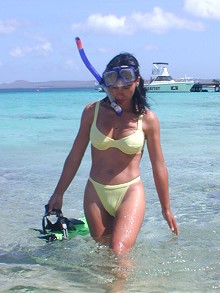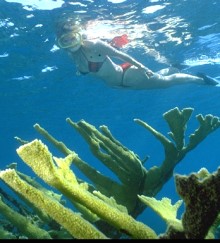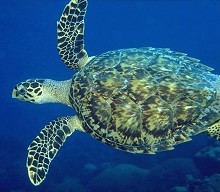|
|
Snorkeling Tips
Basic snorkeling skills (reviewed in the islandwide Introduction to Bonaire Guided Snorkeling)
are designed to make sure you are comfortable with your equipment and can float around the reef,
completely relaxed and enjoying the underwater world. There are easy skills to master,
particularly with the help of a guide. As you get more and more accustomed to snorkeling,
you will feel an urge to dive down and take a closer look at the marine life. This is called
freediving and consists of holding your breath, making surface dive and slowly exploring the reef.
While it's not difficult, most people (particularly beginners) are not immediately comfortable doing
it and most of the reasons for this are easy to sole!
The first area to consider is your natural buoyancy. Some people are floaters; other are sinkers.
This has to do with the relative size of your lungs (in proportion to total body size), percentage
of muscle/fat (muscle weight more than fat) and basic physique. In general, there are far more
floaters than sinkers. If you are a floater and try to freedive, you will have to constantly
kick to keep yourself underwater. This will quickly deplete your air and energy.
Like everything else in the underwater world, relaxation is the key to freediving. You kick only
to move from place to place. How do you offset the natural tendency to float? Your guides will
show you how to add a couple of pounds (not much is necessary) of lead weight to a weightbelt,
which will offset the natural buoyancy. They'll also help you with your surface dive, which,
when you get good, can get you 10 or 15 feet underwater with just one kick. Once you are down,
you should be able to hover without kicking, a sure sign you are correctly weighted. See your
Bonaire Guide for more help in this very exciting area of advanced snorkelling.
In keeping with the conservation philosophy of the island Bonaire, it is recommended that
snorkellers never come in contact with the reef. If you dive down and attempt to stay down
by holding on the coral, several things may happen. First of all, you might cut yourself because
coral is very, very sharp. Two, the coral might accidentally snap off, destroying several hundred
years of growth. Either option is not positive; the guides will be happy to work with you and
make you an effortless freediver.
As you get better and better, you will also learn something called the finger touch technique.
There are parts of the underwater world safe to touch but you need to know exactly which parts.
These are noncoral areas and you can closely observe corals and marine life by steadying yourself
with just the touch of a finger on these parts of the reef. Again, your guides will help you! Snorkel
safely (always with a buddy) and responsibly!
|



|
How to Select a Snorkel Mask
|
Fit is the most important criteria in selecting a mask.
So how do you buy a mask that fits? It's easy.
Here's How:
- Fold the strap over the front of the mask so that it is out of the way.
- Hold the mask against your face.
- Make sure it fits comfortably around your eyes and nose.
- Choose another size if necessary.
- While the mask is against your face, inhale through your nose.
- The vacuum created in the mask should hold it against your face when you take your hand away.
- If the mask doesn't stay put, repeat the process until you find one that does.
Tips:
- Don't settle for an ill-fitting mask.
- If you find more than one mask that fits, compare the features before making your purchase or rental decision.
|
How to Clear Your Snorkel
|
There's no doubt about it. Water will get into your snorkel, whether you submerse
yourself intentionaly or a wave splashes water into it. It's an important
scuba/snorkel skill you need to know.
Here's How:
- Allow yourself to sink below the water until you face is just under the water.
- Take a deep breath through your snorkel.
- Hold your breath.
- Completeley submerse yourself and your snorkel in the water.
- Rise to your original position.
- Blow a sharp blast of air through your snorkel.
- Slowly inhale to see if there is still water in it.
- If there is still water in the snorkel, blow another short blast into it.
- When the snorkel is clear, continue to breath normally through it.
Tips:
- Try not to exhale all your air on the first blast.
- When checking to see if the airway is clear don't suck in a huge gulp of air. Do it slowly.
- Perfect this skill in a swimming pool first.
|
Snorkel Locations
|
 Shore Access Shore Access
 Boat Access Boat Access
 Advanced Diving Advanced Diving
 Good Snorkeling Good Snorkeling
 Guided Snorkel Program Guided Snorkel Program
|
| 1. Boca Bartol |

|
|

|
|
| 2. Playa Bengi |
|

|

|

|
| 3. Playa Funchi |

|

|
|
|
| 4. Bise Morto |

|

|
|

|
| 5. Boca Slagbaai |
|

|

|

|
| 6. Nukove |

|

|
|
|
| 7. Karpata |

|

|
|

|
| 8. La Dania's Leap |
|

|
|
|
| 9. Rappel |
|

|
|
|
| 10. Bloodlet |
|

|
|
|
| 11. Ol' Blue |

|

|
|

|
| 12. Country Garden |
|

|
|
|
| 13. Bon Bini Cas |
|

|
|
|
| 14. 1000 Steps |

|

|
|

|
| 15. Weber's Joy/Witches Hut |

|

|
|

|
| 16. Jeff Davis Memorial |
|

|
|

|
| 17. Oil Slick Leap |

|

|
|

|
| 18. Barcadera |
|

|
|

|
| 19. Andrea II |

|

|
|

|
| 20. Andrea I |

|

|
|

|
| 21. Petries Pillar |

|
|
|
|
| 22. Small Wall (Web Cam) |
|

|
|

|
| 23. Cliff |

|

|
|

|
| 24. La Machaca |

|
|
|

|
| 25. Reef Scientifico |

|
|
|
|
| 26. Buddy's Reef |

|
|
|
|
| 27. Bari Reef |

|
|
|
|
| 28. Front Porch |

|
|
|
|
| 29. Something Special |

|

|
|

|
| 30. Town Pier* |

|

|

|
|
|
| 31. Calabas Reef |

|
|
|
|
| 32. Eighteen Palms |

|

|
|

|
| 33. Windsock |

|

|
|

|
| 34. North Belnem |

|

|
|

|
| 35. Bachelor's Beach |

|

|
|
|
| 36. Chez Hines |

|

|
|
|
| 37. Lighthouse Point |

|

|

|
|
| 38. Punt Vierkant |

|

|
|
|
| 39. The Lake |

|

|
|
|
| 40. Hilma Hooker |

|

|

|
|
| 41. Angel City |

|

|
|
|
| 42. Alice In Wonderland |

|

|
|
|
| 43. Aquarius |

|
|
|
|
| 44. Larry's Lair |

|
|
|
|
| 45. Jeannie's Glory |

|

|
|

|
| 46. Salt Pier* |

|
|
|
|
| 47. Salt City |

|

|
|

|
| 48. Invisibles |

|

|
|

|
| 49. Tori's Reef |

|

|
|

|
| 50. Pink Beach |

|

|
|

|
| 51. White Slave |

|
|

|
|
| 52. Margate Bay |

|

|
|

|
| 53. Red Beryl |

|
|

|
|
| 54. Atlantis |

|
|

|
|
| 55. Vista Blue |

|
|

|
|
| 56. Sweet Dreams |

|
|

|
|
| 57. Red Slave |

|

|

|
|
| 58. Willemstoren Lighthouse |

|
|
|
|
| 59. Blue Hole |

|
|
|
|
|
|